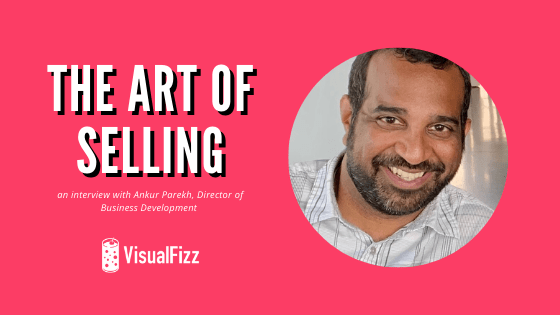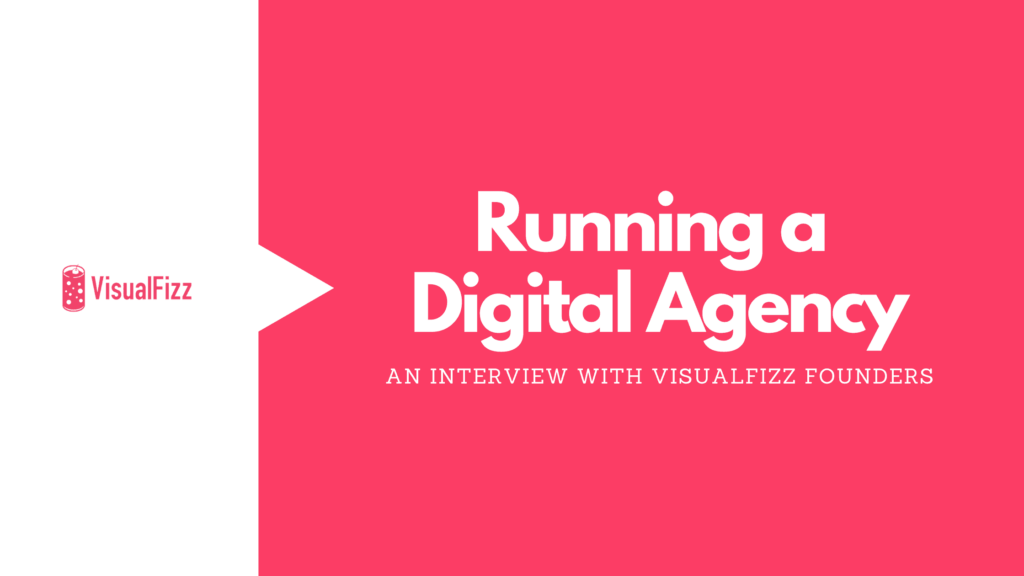
At VisualFizz, we hire our core team members based on a number of credentials, including experience, skillset, industry, and other usual factors. We also pay close attention to the *spark* that drives our team members – that drive simply doesn’t exist in everyone and it can’t really be taught.
We interviewed Ankur Parekh about his recent move to Director of Business Development with VisualFizz and some of the advice he has on the art of personal branding and sales tactics in tech.
Tell us about yourself! First, what’s your primary career background?
Where do I begin? In a nutshell, my career background has really been changing as I have progressed through my career. I have worked in multiple roles over the last 20+ years, with my hands in marketing, finance, pricing, sales, technology, and relationship management. I have worked with startups, mid-sized businesses, and Fortune 500 companies in a variety of industries – consumer product goods, automotive, advertising, marketing, financial services, education, and banking, to name a few.
I really feel the core of my work goes above and beyond any one focus of a business. When I begin a new sales relationship, I try to incorporate what I’ve learned through years in relationship management. I find that the most value is provided when you remember that the entire operational process – finance, marketing, IT, project management, operations, and integration, is all driven by real human people. Keep their full picture in mind, and you’ll better understand their challenges and thinking.
Let’s talk “Personal Brand”. Describe your personal brand from your point of view, and why this is an important factor to how you conduct sales.
I love this question because it gives me a chance to reflect on what makes me unique and which traits either help or hinder my success. I consider myself someone who tries to bring creativity, laughter, and simplification in everything I do and say. While “simplification” and “laughter” don’t necessarily always get paired together, I find by not putting too much stress on myself or forcing situations before the time is right, I can be more attuned to what is needed to build genuine, trusting relationships.
I am naturally empathetic towards others and like to bring a personal touch to everything that I do, whether it be a general conversation with friends or talking to a potential client. I thrive on the relationships and bonds created with others, which provide me the validation and confidence to engage myself more socially and emotionally with that individual. I try to channel that same process into building and maintaining the client relationship.
What excites you the most about Business Development, Sales, and your career path?
This ties back to my personal brand. Because of my social nature, I am excited to have conversations and establish relationships, even though it can be a slow process. I enjoy watching the trust and confidence grow between myself and a prospective or current client. I’ve seen incredible things happen because of those strong, trusting relationships, and it’s really something to watch those professional bonds grow and develop on an individual or team level.
I also get excited about meeting new people and the art of conversation. I love waking up every day and creating a unique plan of action. No two days are alike (especially in a marketing agency setting!), and it’s exciting and motivating to me to see how the day unfolds with new connections, conversations, and strengthening of existing relationships. I love to hear different viewpoints from my contacts to get a gauge and pulse of the big picture for them.
Curveball coming your way: What’s more difficult to sell – Tech or Services?
I believe tech and services each have their own set of challenges, and each needs to be approached differently.
With tech sales, you have a tangible product that produces a benefit to a company or individual. However, this software or hardware is only beneficial to the needs of people at a specific organization. Those people have to consider internal costs and resource costs when making their decisions. With tech, you need to not only sell the value of your product, but also, once you sell the value, you now must compete with competitor costs, your margins, and alternative and existing solutions for a company.
Selling services requires a completely different mindset and strategy. This is because you do not have a tangible product, but your value is based on your experience and ability to prove you’ve got the expertise it takes to create an impact on your client’s bottom line. With services, you have the advantage of being able to fluctuate margins based on ability to win the deal, however, you have the challenge of aligning a company’s needs with your offerings.
It’s also easier to sell services that are done well and result in happy customers (like VisualFizz’s clients!). Word of mouth referrals are the most valuable of all, and the trust that is established from that sale can’t be recreated.
What’s an element of the Selling and/or Growth process that you feel changes the game?
Establishing relationships! The initial mindset of selling should not be just trying to win the deal or make the sale. It starts with understanding the needs of the prospect. Consider all conversations to be a discovery process of the client’s pain points and what they doing to minimize costs and mitigate risks.
You should never come into the process with a solution until you can establish rapport and trust and you really understand the current process and solutions, including what is working and what is not working.
The best thing you can do is to ask questions and build upon comments made without offering a solution. Keep the conversation going and learn all that you can about them, without (yet) offering a solution.
Allow your prospect to talk through their process or integration, which sometimes leads to self-discovery of where they can improve on their own – a win-win for the both of you. Provide responses and even empathy about their comments and frustration, which should help build a positive bond between you and the prospect. This is where that personal brand comes in!
Depending on your sales cycle, your recommendations should only be offered near the end of the conversation or even on the next call, once you can align their needs with your solutions.
What’s the best way to convey brand value without being too “sales-y”?
The people, feelings, passions, and personal experiences of the individuals that make up your brand is what makes your brand unique and makes you relatable. Your brand is made up of the unique people that work for your organization, so you can (and should) leverage this when deepening the client relationship.
It is okay to discuss (with explicit permission, of course):
- Passions, interests, and hobbies of the people on your team
- Common professional and personal experiences with a client
- Empathy towards pain points and frustrations
- Honesty with capabilities and certain limitations
- Offering referrals to current clients to get a different viewpoint
All of this provides commonality and relationship-building with others. You are selling your brand and you are also selling the people that make up that brand.
What are your recommendations for managing and maintaining these relationships once they exist?
Just because you’ve signed a contract with a client doesn’t mean your work is done. “Business development” is the development of your business from beginning to end. Longterm relationship management is just as important (and can be just as lucrative) as the initial sale.
The goal is to ensure satisfaction and maintain a client relationship for years to come. It’s your job to learn what it takes to achieve that goal.
Maintain open communication with clients throughout the business relationship, whether it be for 5 months or 5 years. Schedule recurring meetings in-person or over the phone to ensure that you stay top of mind with the client and keep the trust and confidence of your relationship. This includes asking for and providing business reviews, status check-in meetings, or simply asking how their kid’s baseball tournament went.
What this leads to is a baseline trust that you are the expert and that your company truly values the relationship with the client. This opens the door to potential upselling of additional products and services and can even keep competitors trying to win the business away from you at bay.
How do you stay motivated to grow businesses?
When a client or company gives you the opportunity to do what you do best, that’s motivating to me. I am motivated to prove to businesses that relationships are essential, the services my organization provides are integral, and growth is not only possible but very achievable through those services.
I also feel empowered by my ability to create long-term relationships and the referrals that come with it. This increases my confidence in my abilities and expertise, while keeping me motivated to go above and beyond every day to ensure that opportunities continue to exist. It is essential and motivating that the client and I are working towards the same goals and as part of one team.
Finding what your confident in can have huge impacts on your motivation. Each of us has different strengths and natural abilities. What uniquenesses and strengths do you bring to the table? Play to them.
How can we stay in contact with you?
I am always open to a chat to talk about my experiences and any other advice that I can give to help you become more successful. Please feel free to reach out to me at:
Publishing Date:






